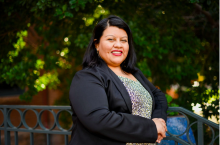Editor’s Note: The Department of Spanish & Portuguese Studies welcomes three new Assistant Professors in the 2021-2022 academic year. We will be profiling each of these faculty members over the course of the year. This article is the second in a series of three.
Angélica Amezcua is the new specialist of Spanish Linguistics in the Department of Spanish & Portuguese Studies, as well as the new Director of the Spanish Heritage Language program. Amezcua began teaching in the department as an Assistant Professor in the autumn of 2021.
Amezcua’s area of expertise is Spanish Linguistics with a focus on Spanish Heritage Language Education and Research. Elaborating further, she notes, “What interests me the most is that I am able to examine how university Spanish heritage language courses can play an important role in promoting the use of Spanish in the United States, counteracting the devaluation of minority languages, and contributing to narrow the Latinx student achievement gap.”
Active in publishing, Amezcua’s most recent publication “…describes Spanish Heritage Language learners’ experiences with remote instruction…This research emphasizes the need to design effective online courses that foster [social presence] as a key element to diminish feelings of isolation and encourage active participation in the classroom. My colleagues and I propose that teaching presence is an essential component of social presence in online [Spanish Heritage Language] courses.” Amezcua is currently finalizing a manuscript that examines “the impact Spanish Heritage Language courses could have on Spanish Heritage language speakers. My findings show that the course helped students gain linguistic confidence, reinforcing their linguistic capital.” She is also writing a book in collaboration with two colleagues on Heritage language program direction.
Amezcua is a presence in the field of Spanish Heritage Language Research and Education in the United States as a member of the organizing committee for the 9th National Symposium on Spanish as a Heritage Language (NSSHL), taking place February 24-26 at Florida State University.
This academic year, Amezcua teaches three courses, SPAN 316, SPAN 498 and SPAN 543. Each course differs significantly as one is a course for Spanish Heritage language learners, another in Linguistics, and the third a Graduate course.
Of her two undergraduate courses, her autumn quarter course, SPAN 316 differed from other Heritage classes she has taught due to its focus primarily in literature. As a linguist, SPAN 316 was her first literature based-course; she enjoyed teaching this course and collaborating with her students. In teaching this course Amezcua recognized some of the qualities of undergraduate students here: “I admire UW students’ discipline and commitment to learning more about their language, their communities, and the impact of the Latinx community around the world.” For winter quarter, Amezcua is teaching SPAN 498, an Applied Linguistics course. Amezcua characterized the course: “It is an intensive, interdisciplinary seminar focusing on key intellectual current trends in the (1) development of Second Language Acquisition Theory and Practices and (2) Spanish Heritage Language research and pedagogy approaches.”
Her Graduate seminar, SPAN 543 will be taught in spring quarter and “introduces students to the sociolinguistic and pedagogical issues surrounding the teaching and research of Spanish as a heritage language in the United States.” Amezcua added: “Students will learn about who is a Heritage speaker, their needs, the adequate teaching practices for these students, and the up-to-date research [in] this field. This course has a practical component to prepare graduate students to teach these courses [in Heritage language].”
Amezcua has been settling into life in Seattle: “This is my first time living in a city, and I am really enjoying it. I appreciate how accessible public transportation is” she said. Amezcua grew up in agricultural communities, first in Tuxcueca in Jalisco, México, and then at age 11 immigrated with her family to Fillmore, California, but the experience of living in Seattle is not totally dissimilar: “I like how green it is; it reminds me of Fillmore”. Elaborating on the city, “I feel that you will never get bored in Seattle, even now with the restrictions due to Covid, there are so many outdoor activities that you can do. I look forward to exploring more about this city and the state. Many of my students are from Yakima, and I am so intrigued to visit this place that I decided I will go in the summer.”
Angélica Amezcua earned her PhD in Spanish-Spanish Linguistics in 2021 from Arizona State University. Amezcua earned an MA in Spanish in 2018 from Arizona State University and an MA in Chicana/o Studies and Spanish from California State University, Northridge, in 2015. She graduated with a BA in Chicana/o Studies and Spanish from California State University, Northridge, in 2011.
By Casey Colvin
